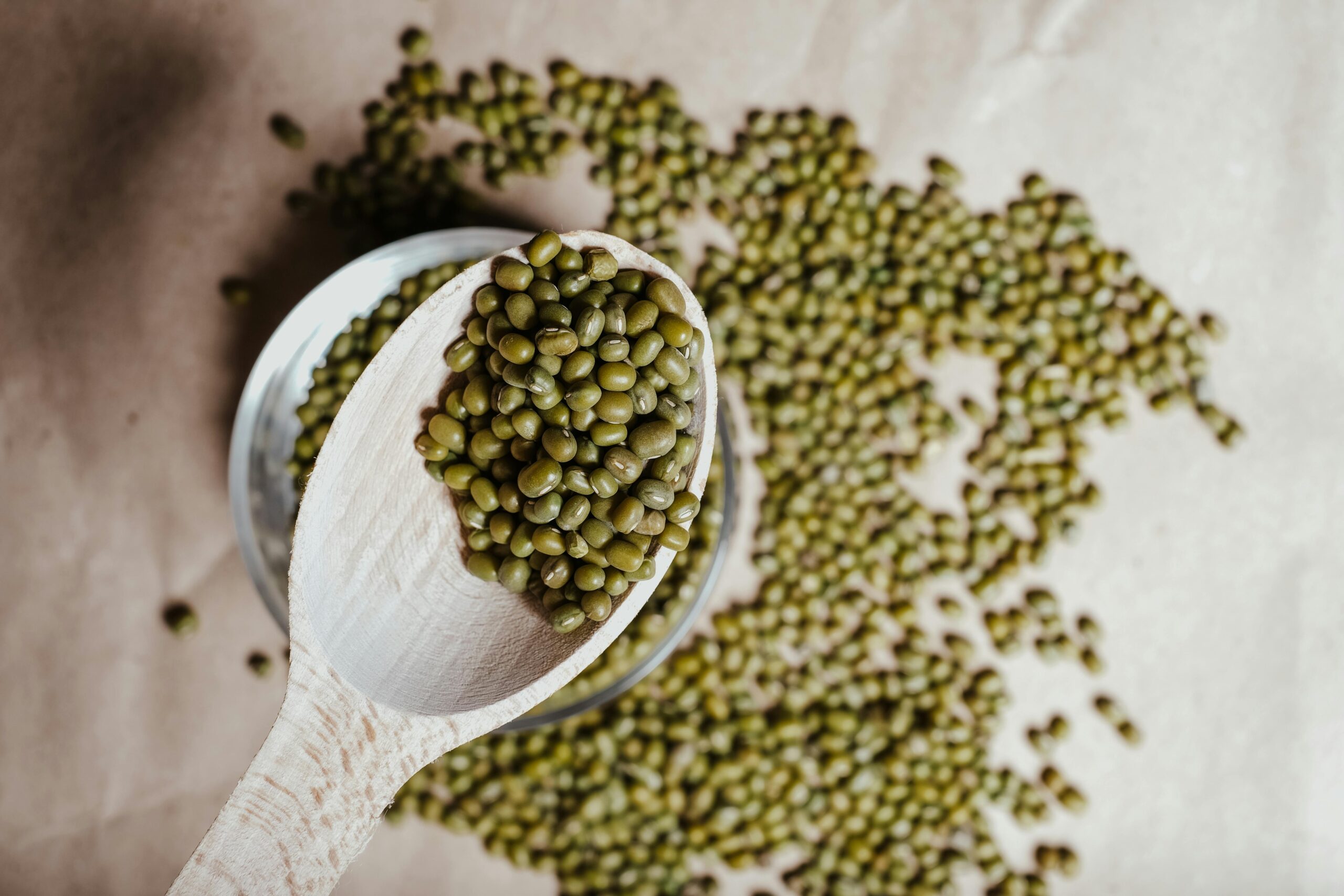Did you know?
Research shows that Mung beans/moong beans is an important pulse consumed all over the world, especially in Asian countries, and has a long history of usage as traditional medicine.
It has been known to be an excellent source of protein, dietary fiber, minerals, vitamins, and significant amounts of bioactive compounds, including polyphenols, polysaccharides, and peptides, therefore, becoming a popular functional food in promoting good health.
Today, we will delve into the 5 mung beans benefits and their nutritional value:
1. Nutritional Benefit
According to ncbi, here are the nutritional value of the mungbean seeds.
| Component | Content per 100 g mungbean seeds |
| Protein | 22.9 g |
| Fats | 1.2 g |
| Carbohydrate | 61.8 g |
| Fibre | 4.4 g |
| Folic acid | 140 μg |
| Calcium | 124 mg |
| Iron | 7.3 mg |
| Magnesium | 171 mg |
| Potassium | 843 mg |
| Sodium | 28 mg |
| Carotene | 94 μg |
Additionally, mung beans boast an array of micronutrients, including iron, folate, magnesium, and potassium, essential for maintaining optimal health.
Protein Powerhouse
Moong beans provide a hefty dose of plant-based protein, making them a valuable addition to vegetarian and vegan diets. Protein is crucial for muscle repair and growth, as well as supporting a strong immune system.
Micronutrient Rich
Moong beans are brimming with micronutrients like iron, which is essential for oxygen transport in the body, folate, crucial for cell division and DNA synthesis, magnesium, vital for nerve and muscle function, and potassium, important for maintaining fluid balance and blood pressure regulation.
2. Helps in Fighting Diseases
There are many benefits of moong but one of them is mung helps us to stay away from chronic diseases as it contains many healthy antioxidants. Mung beans better hyperglycemia, hyperlipemia, and hypertension, and can also prevent cancer.
Consuming mung can result in the reduction of symptoms of diabetes, allergies, autoimmune diseases, etc. Here are some diseases whose risk can be lower if we consume mung:
Heart Health Savior
Moong beans are heart-healthy legumes, known for their ability to improve cardiovascular function and reduce the risk of heart disease. Their high fiber content helps lower cholesterol levels and maintain healthy blood pressure, while their potassium and magnesium content supports optimal heart function.
Diabetes Defender
For individuals managing diabetes or aiming to prevent the condition, moong beans are an excellent dietary choice. With a low glycemic index, they help stabilize blood sugar levels, preventing spikes and crashes that can contribute to insulin resistance and diabetes.
Cancer Combatant
The antioxidants found in mung beans, including vitexin and isovitexin, possess powerful anti-cancer properties, helping to neutralize free radicals and protect cells from damage. Regular consumption of these may lower the risk of certain types of cancer and support overall health.
3. Weight Management
Moong beans are a weight watcher’s dream. These little considers are low in calories and high in fiber, making them an optimal extension to any weight decrease schedule.
The fiber content associates keep you feeling full for longer, controling those problematic cravings and preventing glutting. Moreover, moong beans are a rich wellspring of plant-based protein, which assists with muscle fix and improvement as well as lifts processing, further supporting weight the board tries.
4. Support Digestive Health
It promote digestion and eliminate toxins. A strong stomach is essential to as a rule, and these beans are here to help. Stacked with dissolvable fiber, they advance typical strong releases and thwart stoppage.
Besides, moong beans contain safe starch, a kind of sugar that goes probably as a prebiotic, dealing with the supportive microorganisms in your stomach.
This advances a sound stomach microbiome, which is essential for real handling and safe capacity.
5. Maintain Bone Health
Make an effort not to permit their little size to deceive you; mung beans are an amazing powerhouse of enhancements major for bone prosperity.
They are stacked with calcium, magnesium, and phosphorus, all of which accept pressing parts in saving up serious solid areas for with strong bones.
Calcium is significant for bone thickness, while magnesium upholds calcium osmosis and phosphorus helps in bone turn of events. Coordinating moong beans into your eating routine can help with preventing bone-related issues like osteoporosis and breaks, ensuring your skeletal system stays energetic for a seriously lengthy timespan into what’s to come.
Takeaway
Coordinating mung beans into your eating routine can yield a crowd of clinical benefits, from assisting with weight the leaders to supporting stomach related and bone prosperity.
These adaptable vegetables can be had a great time various dishes, from soups and blended greens to curries and skillet burns. So why hold on? Harness the power of moong beans and make a step towards a superior, more euphoric you.
Explore more blogs from nutrition-e
Frequently Asked Questions (FAQs):
1. Can I eat mung beans every day?
Yes, it’s generally safe and healthy to consume mung beans daily as part of a balanced diet.
2. Is mung bean a protein or carb?
Mung beans contain both protein and carbohydrates, with a notable protein content.
3. Is mung bean good for skin?
Yes, mung beans are beneficial for the skin due to their antioxidants and vitamins, aiding in skin health.
4. Are there any mung bean side effects?
Some individuals may experience digestive discomfort like gas or bloating. Allergy sufferers should avoid mung beans.
5. Can mung beans help with weight loss?
Yes, mung beans are low in calories and high in fiber, which can help promote satiety and support weight management goals.
6. How should I prepare mung beans?
Mung beans can be cooked in various ways, including boiling, sprouting, or incorporating them into soups, salads, and curries. Rinse them thoroughly before cooking to remove any debris.
7. Are mung beans gluten-free?
Yes, mung beans are naturally gluten-free, making them suitable for individuals with gluten sensitivities or celiac disease.

